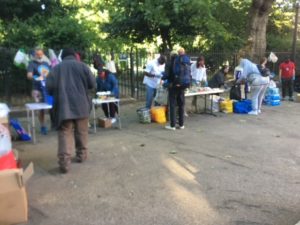As economic crises spread, our children see more homeless people on the high street, more poverty adverts on TV and more friends or acquaintances going through difficulty. These scenes and scenarios become normalised for them too.
Have We Become Desensitised?

What comes to mind when I say ‘information’? Is it the media? The internet? Libraries and books? No matter what form it takes, information is all around us, an integral part of our daily lives.
But there’s a second type of information, arguably more important than the first, that isn’t restricted to the flesh of a book or the database of a search engine. What am I talking about? The best way I can describe it (though it’s still a complex and ambiguous definition) is the life code of the universe. The sights you see, the sounds you hear, the sensations you feel; all of these are your experiences of this information. Fundamentally, the relationship between you and this type of information is very similar (if not identical) to the relationship between a computer and data. In the same way as a computer, your mind is constantly at work processing, organising and storing all your experiences of the information around you into a network to be drawn on in the future.
The consequences of repetitive exposure
To prevent itself from being overwhelmed by the sheer quantity of information around it, the mind has adapted to become more efficient in the way it organises our experiences. When you experience something for the first time (be it a new sight, smell, taste or otherwise), a new category is created (similar to a new folder on a computer) to store this information in your mind’s ‘database’. This folder initially feels new, alien almost, and thus receives a lot of attention. But after that, you gradually become more and more used to it, paying less and less attention to it over time. And while this technique is undoubtedly beneficial (as it allows the mind to focus on new experiences and learn more about the world around it), it has the potential to cause much more harm than good.
Let me give you an example: say you’re watching TV, and a charity advert appears between the programmes, portraying disturbing visual images of suffering, poverty and hardship. Naturally, you would feel upset, and probably angry as well, that this suffering was allowed not only to happen in a world that could easily cater for all of its inhabitants, but to continue as well. And while these aren’t nice ways to feel, your empathy and sensitivity to these people’s suffering drives you to help them (by donating, volunteering or otherwise) and therefore leads to a positive outcome. Now imagine the breaks between the programmes were bombarded with that same advert playing in a never ending loop, again and again and again. Would you still feel as upset the second time you watched it? The third time? The fourth? The tenth?
The more we see it, the more we become used to it, and the less significant it becomes to us. After the initial flurry of emotion we feel, our minds gradually become accustomed to it, leading to a more stifled emotional response each time. The result? We become desensitised. Normalised to the pain and suffering of others. We see it not for what it is but for what our minds tell us it is: a normality. Maybe even a fact of life. And that, that is a truly dangerous and debilitating mindset to have, not least because it robs us of a reason to help and donate. Why would we? When our minds, like miniature Satans whispering in our ears, tell us that we can’t make a difference?
And unfortunately, no one is immune to the shackles of desensitisation. Our children are also affected. As economic crises spread, our children see more homeless people on the high street, more poverty adverts on TV and more friends or acquaintances going through difficulty. These scenes and scenarios become normalised for them too.
But that’s not to say we can’t break free of these shackles of desensitisation. And the remedy, the antidote some might say, is so wonderfully simple, it’s a mystery why it isn’t more widely known and circulated. All it needs is for us to truly reflect on the pain and suffering of others. Because desensitisation is like a veil between us and reality: with only a quick glance, and barely a thought given to the matter, we’ll always be confined to the narrow minded, distorting lens created by the veil. But just a moment to ponder on the suffering of others, and the devastating hardships a lot of people endure, will help lift this veil, and allow us to see reality clearly, to imagine the incessant hurt- if not with our eyes then with our hearts. In doing so, we can transform an undeniably detrimental side effect into an opportunity to see reality even clearer than before.
So let’s not longer bury our heads in the sands of ignorance. Let’s not choose comfort over truth. Let’s read books about experiences of war, conflict and abuse. Let’s watch uncomfortable documentaries on genocide and let’s talk to our children in an age appropriate manner about these issues and how they affect our fellow humans. And together, we can come up to practical strategies to help such as volunteering our time for charities, homeless shelters or food Banks and using our voices to demand change.
The magnitude of suffering in our world is overwhelming, sickening even, as behind it lies a story of human greed and selfishness, and a willingness to profit from the suffering of others. Suffering that’s multi faceted and emotionally scarring, ranging from parental loss and trauma, to a life of poverty and hardship. And this pain has only increased during this pandemic.
But, as is often seen throughout history, the suffering of some brings out the best in others. The driver to act, give and advocate. Striving for truth and justice. Because really, if we are not part of the solution, are we not part of the problem?
By the ˹passage of˺ time! Surely humanity is in ˹grave˺ loss, except those who have faith, do good, and urge each other to the truth, and urge each other to perseverance. (Quran 103: 1-3)

